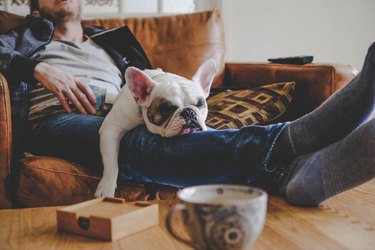
It's just after lunch and you're fading fast. Should you go lie on your couch for a little power nap? Or will you wake up all groggy and worse off than before?
"A power nap is a 20-minute nap that's taken earlier in the day to optimize performance and mood," says Shelby Harris, PsyD, a behavioral sleep medicine doctor in private practice in Westchester, New York and author of The Women's Guide to Overcoming Insomnia: Get a Good Night's Sleep Without Relying on Medication.
Video of the Day
Video of the Day
That's way different than a nap that can span a couple hours, which can leave you dazed and woozy when you wake up and make it tougher to wind down later. During long naps, you enter into deeper stages of sleep, which is why you can wake up with sleep inertia. On the other hand, a quick nap can be energizing.
"A power nap is a shorter nap that's refreshing and can help make you more alert for a few hours without interfering with nighttime sleep," Harris says.
Before we detail exactly how to take a power nap, we'll need a disclaimer. If you have insomnia — that is, you usually have trouble falling asleep, staying asleep or waking up too early — skip the naps because it might worsen sleep problems, Harris says.
"Essentially, you're snacking on sleep throughout the day and won't be as hungry for sleep at night," she says.
While a power nap can take the edge off of a bad night of sleep, you shouldn't rely on any kind of nap to make up for poor sleep regularly, as it just reinforces snooze issues.
Now that that's out of the way, here's your step-by-step plan for making a perfect power nap happen:
1. Plan for Post-Lunch
It's natural to get sleepy right after lunchtime, around 1 p.m., Harris says. Leaning into this time will make it easier to fall asleep. Make sure you schedule calls and tasks appropriately if you're planning to take this break.
Wait until later and you might not have the urge anymore. Plus, napping after 2 p.m. may interfere with bedtime.
2. Head to Your Room
If you're at home, go to your bed. In your room, it's easier to recreate the ideal sleep environment you have at night, which is laying somewhere cool, dark and comfortable, Harris advises.
Not at home? Just find a place where you can recline or lay down, she says. Wear an eye mask if you have one, which will block out the light. Listening to white noise can help drown out nearby noise that can get in the way of drifting off.
3. Set Your Timer
Your nap should be 20 minutes, but it'll take a bit of time to fall asleep, so allot 30 minutes, Harris says. Schedule an alarm on your phone so you wake up when you plan to.
What Is the Best Nap Length?
The best nap length is 10 to 20 minutes because that amount of sleep can help you feel rested, but not drowsy afterwards, according to the Sleep Foundation.
4. Relax
"You cannot force sleep," Harris says.
Rather than stressing about your ability to drift off or putting pressure on yourself to do so, remind yourself that this is a time for relaxation or meditation.
"Using this time to decompress can be quite refreshing as well," she says.
Bonus Boost: Try a Coffee Nap
If you are really sleepy or have something big coming up that you need to be extra alert for, try a “coffee nap.” This means you drink coffee before the nap.
“Caffeine takes 30 minutes to hit your bloodstream, so when you wake up from the nap, you get the double boost,” Harris says.
Is It Bad to Need Naps?
If you struggle with daytime sleepiness, you may need to evaluate just how much sleep you're getting at night and make adjustments to your schedule if you're able. For the record, the Sleep Foundation recommends adults get seven to nine hours per night.
However, Harris advises seeing your doctor, who may want to evaluate you for a sleep condition (sleep apnea, for example) if:
- You regularly can't get through the day without feeling sleepy or dozing off
- You need multiple naps per day
- Routine naps are not refreshing
- You need a coffee nap every day
Related Reading
Is this an emergency? If you are experiencing serious medical symptoms, please see the National Library of Medicine’s list of signs you need emergency medical attention or call 911.